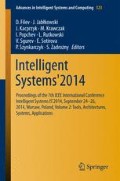Abstract
The producers assessment problem has many important practical instances: it is an abstract model for intelligent systems evaluating e.g. the quality of computer software repositories, web resources, social networking services, and digital libraries. Each producer’s performance is determined according not only to the overall quality of the items he/she outputted, but also to the number of such items (which may be different for each agent).
Recent theoretical results indicate that the use of aggregation operators in the process of ranking and evaluation producers may not necessarily lead to fair and plausible outcomes. Therefore, to overcome some weaknesses of the most often applied approach, in this preliminary study we encourage the use of a fuzzy preference relation-based setting and indicate why it may provide better control over the assessment process.
Access this chapter
Tax calculation will be finalised at checkout
Purchases are for personal use only
Preview
Unable to display preview. Download preview PDF.
References
Alonso, S., Cabrerizo, F.J., Herrera-Viedma, E., Herrera, F.: h-index: A review focused on its variants, computation and standardization for different scientific fields. Journal of Informetrics 3, 273–289 (2009)
Bouyssou, D.: Ranking methods based on valued preference relations: A characterization of the net flow method. European Journal of Operational Research 60, 60–67 (1992)
Bouyssou, D., Marchant, T.: Ranking scientists and departments in a consistent manner. Journal of the American Society for Information Science and Technology 62(9), 1761–1769 (2011)
Cena, A., Gagolewski, M.: OM3: Ordered maxitive, minitive, and modular aggregation operators – Axiomatic and probabilistic properties in an arity-monotonic setting. Fuzzy Sets and Systems (in press, 2014), doi:10.1016/j.fss.2014.04.001
Dasgupta, M., Deb, R.: Transitivity and fuzzy preferences. Social Choice and Welfare 13, 305–318 (1996)
Fodor, J., Roubens, M.: Fuzzy Preference Modelling and Multicriteria Decision Support. Springer (1994)
Franceschini, F., Maisano, D.A.: The Hirsch index in manufacturing and quality engineering. Quality and Reliability Engineering International 25, 987–995 (2009)
Fürnkranz, J., Hüllermeier, E. (eds.): Preference Learning. Springer, New York (2011)
Gagolewski, M.: Scientific impact assessment cannot be fair. Journal of Informetrics 7(4), 792–802 (2013)
Gagolewski, M., Mesiar, R.: Monotone measures and universal integrals in a uniform framework for the scientific impact assessment problem. Information Sciences 263, 166–174 (2014)
Herrera-Viedma, E., Herrera, F., Chiclana, F., Luque, M.: Some issues on consistency of fuzzy preference relations. European Journal of Operational Research 154, 98–109 (2004)
Hirsch, J.E.: An index to quantify individual’s scientific research output. Proceedings of the National Academy of Sciences 102(46), 16569–16572 (2005)
Hovden, R.: Bibliometrics for internet media: Applying the h-index to YouTube. Journal of the American Society for Information Science and Technology 64(11), 2326–2331 (2013)
Klement, E., Mesiar, R., Pap, E.: A universal integral as common frame for Choquet and Sugeno integral. IEEE Transactions on Fuzzy Systems 18, 178–187 (2010)
Nocedal, J., Wright, S.: Numerical Optimization. Springer, New York (2006)
Peneva, V., Popchev, I.: Aggregation of fuzzy preference relations to multicriteria decision making. Fuzzy Optimization and Decision Making 6, 351–365 (2007)
Quesada, A.: Monotonicity and the Hirsch index. Journal of Informetrics 3(2), 158–160 (2009)
Sugeno, M.: Theory of fuzzy integrals and its applications. Ph.D. thesis, Tokyo Institute of Technology (1974)
Tanino, T.: Fuzzy Preference Relations in Group Decision Making, pp. 54–71. Springer, Heidelberg (1988)
Woeginger, G.J.: An axiomatic characterization of the Hirsch-index. Mathematical Social Sciences 56(2), 224–232 (2008)
Author information
Authors and Affiliations
Corresponding author
Editor information
Editors and Affiliations
Rights and permissions
Copyright information
© 2015 Springer International Publishing Switzerland
About this paper
Cite this paper
Gagolewski, M., Lasek, J. (2015). The Use of Fuzzy Relations in the Assessment of Information Resources Producers’ Performance. In: Filev, D., et al. Intelligent Systems'2014. Advances in Intelligent Systems and Computing, vol 323. Springer, Cham. https://doi.org/10.1007/978-3-319-11310-4_25
Download citation
DOI: https://doi.org/10.1007/978-3-319-11310-4_25
Publisher Name: Springer, Cham
Print ISBN: 978-3-319-11309-8
Online ISBN: 978-3-319-11310-4
eBook Packages: EngineeringEngineering (R0)

